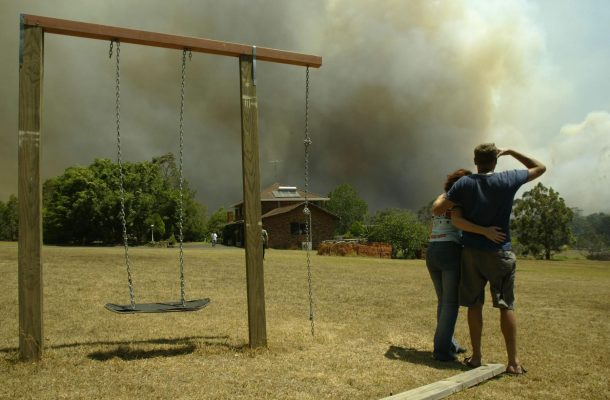When our love of place gets swallowed by bushfires

Like many Australians, a summer holiday for me means camping in one of our beautiful national parks. Days are spent surrounded by nature, with walks along the beach and ocean swims. After meals shared under a tapestry of stars we’re lulled to sleep by the sounds of the sea and woken by the dawn chorus of birdsong.
It is one week a year where we disconnect from the pressures of life in the city and reconnect with one another and the living world around us. Our annual family camping trips have been to Thurra River in Croajingalong National Park in East Gippsland.
We have developed a deep connection to this place and memories of special times there help to steady us though life’s inevitable ups and downs.
All of us have our ‘happy place’ where we have developed our ‘topophilia’ or love of place. So, when these places are damaged or destroyed by bushfire, the loss felt is profound. Environmental psychologist, Glenn Albrecht, calls this feeling ‘solastalgia’, a sense of nostalgia for our home as it once was.
This is experienced by many people living in close contact to the land, like farmers and those in rural or remote communities. I believe it also effects people like me who might only visit their meaningful place annually.
As East Gippsland burns, and smoke chokes its forests right down to the sea, thousands upon thousands of plants and animals are being killed and the waterways blackened with ash.
The campsites have all been evacuated, roads closed, and courageous men and women try their best to control the fires, sometimes losing their own in the process. Volunteers try to save injured wildlife but are often overwhelmed by the high need and lack of resources.
Sitting here in safety, back in Melbourne, I can only wait to see what the final outcome will be. For days now, my phone has been pinging with another emergency alerts. Apart from my angst about the fires in Victoria, I am also anxiously checking on the New South Wales fires.
My oldest son, who had gone camping with friends, was evacuated from the beachside campground he was staying in at 4am on New Year’s Eve. He spent two days in Bega before travelling to Canberra and is now on the road home, hopefully avoiding catastrophic fires in the Alpine region.
This is the new normal and what those of us who have been advocating for action on climate change for the past decades have been expecting. We are standing at the end of the ‘critical decade’ for action on climate change with a Prime Minister who seems to have his ‘happy place’ in Hawaii.
As a medical doctor who has been communicating the health impacts of climate change for many years, the declaration of a climate emergency by the AMA and medical colleges is welcome, if not somewhat tardy.
That the increased severity, frequency and duration of the fires is the result of climate change is agreed by all those familiar with climate science. This includes emergency workers who have to cope with a cavalcade of disasters each summer.
Nationally, the health impacts of these current bushfires amount to an unprecedented public health threat. Physical effects include death and injury from burns and falling objects and heart and lung conditions due to inhalation of smoke and poor air quality.
Psychological impacts encompass grief, post-traumatic stress disorder, depression, anxiety and the increase in social pressures due to loss of homes and livelihoods. All of these health impacts cause immediate and long-term harm. Especially vulnerable are children, pregnant women, the elderly and those with pre-existing health issues.
As Croajingalong burns in Victoria and my son travels through a smoke haze from Canberra, grief and anxiety jostle for my heart’s attention. This Melbournian won’t be watching the cricket, I’ll be looking to the northeast and hoping for a respite from the fires.
Dr Dimity Williams is a Melbourne General Practitioner and the Biodiversity Convenor for Doctors for the Environment Australia. She is passionate about the natural world and campaigns for the protection of our environment.













